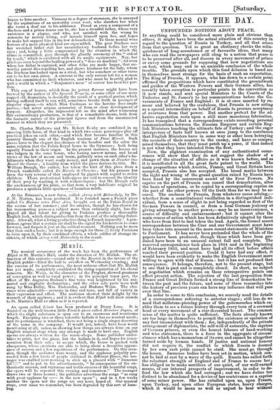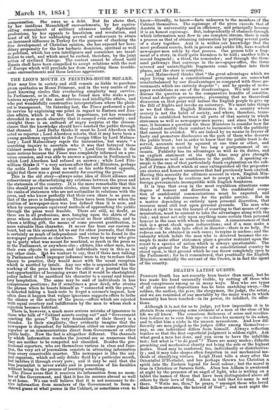TOPICS OF THE DAY.
UNFOUNDED NOTIONS ABOUT PEACE.
IF anything could be considered more plain and obvious than others, it might have been the actual situation of this country in regard to the question of Russia in Turkey, and all that arises from that question. Yet so great an obstinacy checks the relin- quishment of long-accustomed or of favourite ideas' that many who can read the newspapers still cling to a notion that peace is to be preserved after all, and discern in every movement of prince or envoy some grounds for supposing that new negotiations are on foot, which may end in an amicable conclusion of the whole trouble. The grounds upon which this fond delusion is based are in themselves most strange for the basis of such an expectation. The King of Prussia, it appears, who has down to a certain point affirmed the propositions which have constituted the groundwork and guides of the Western Powers and their German allies, has recently taken exception to particular points in the convention as it now stands, and sent special Ministers to the Courts of the Tuileries and St. James's to lay communications before the Go- vernments of France and England : it is at once asserted by ru- mour and believed by the credulous, that Prussia is now acting as a special intermediary on behalf of Russia to procure acceptance of overtures from that power. But another pretext for the ad- hesive expectation rests upon a still more monstrous fabrication. It has transpired that a correspondence exists recording personal communications between the Russian Emperor and certain Eng- lish Ministers touching the ultimate fate of Turkey; and the eager interpreters of facts half known at once jump to the conclusion that English Ministers have in .some way or other been betraying the councils of their country to the enemy, and have so compro- mised themselves' that they must patch up a peace, if that indeed is not what they have intended from the first. Now, the slightest examination of any authenticated occur- rences will show that they do not suggest the shadow of a change of the situation of affairs as it was known before, and as it is manifested in all the great facts patent to the world. The main propositions which Austria, France, and Great Britain have accepted, Prussia also has accepted. The broad marks between the right and wrong of the grand question raised by Russia have been fixed by the concurrent assent of the Four Powers. No caprice on the part of Prussia can cancel that demarkation, alter the basis of operations, or be copied by a corresponding caprice on the part of the other powers. Of the truth thus far we may be as- sured. The coolness of Prussia, from whatever cause arising,— whether from a constitutional vacillation in a distinguished indi- vidual, from a sense of slight in not being regarded as first of the Get man Powers in council, or from a local German jealousy at giving advantage to another power,—may be an inconvenience a source of difficulty and embarrassment; but it cannot alter inconvenience, main course of action which has been definitively adopted by those who have from first to last taken the lead. Again, the former secret correspondence between the Czar and our Government must have been taken into account in the more re. cent statements of Ministers to Parliament. It has never been pretended that the whole of the papers have been produced, though those which have been pro- duced have been to an unusual extent full and complete. The reserved correspondence took place in 1844 and in the beginning of February 1853, and must have had all its effect before affairs reached their present position. Could it have had any effect, it would have been evidently to make the English Government more willing to agree with that of Russia : but it has not produced that consequence. It belongs, therefore, not to the present stage but to one that is past and is completely, closed. In short, no subject of negotiation which remains on these retrospective points can affect present action. The rejection of the last proposition from France and Great Britain formed a strong line of demarkation be- tween the past and the future, and none of these researches into the history of previous years can have any influence that will pass over that line.
In order to come to this conclusion, we scarcely need the details of a correspondence referring to anterior stages ; still less do we need that millstone-piercing power of the gobemouches which en- ables them to see a future history through every turn of a crowned head or every movement of a star-decorated breast. The common sense of the matter is quite sufficient. The facts already known are too large in themselves to permit the existence or operation of any fact inconsistent with them ; for, independently of the private arrangement of diplomatists, the self-will of autocrats, the caprices of German princes, or even the honest labours of hard-working and wise statesmen, there is a force in the aggregate of circum- stances which has a momentum of its own and cannot be altogether turned aside by human hands. If justice and national honour did not require it, the conflict to which Russia is doomed by her own rash pride cannot be staid. She must go through the lesson. Immense bodies have been set in motion, which can- not be laid at rest by a wave of the quill. Russia has called forth the reluctant strength of England and of France to coerce her;
has obliged us to make sacrifices of our quiet, of our well-earned means of our internal prospects of improvement, in order to de- fend the law which she had outraged ; and we have duties too distinct to be abandoned for a device of her contrivance or a caprice of some minor power. She has entailed upon us' upon France, upon Turkey, and upon other European states heavy charges, which it would be mean as well as unjust states, bear without
compensation. She owes us a debt. But far above that, by her insidious Menschikoff encroachments, by her equivo- cating concealment of military advances under diplomatic professions, by her appeals to fanaticism and revolution, and most of all by her unblushing avowal of endeavours to attain an increased influence in Turkey for the purpose of checking the free development of Christian opinion, she has exposed her here- ditary propensity for the low barbaric dominion, spiritual as well as political, which her own intelligence and conscience are insuf- ficient to curb, and which must be curbed, therefore, by the joint action of civilized Europe. The contest cannot be closed until Russia shall have been compelled to accept relations with the rest of Europe which will preclude her from repeating these trouble- some encroachments and these lawless aggressions.



























 Previous page
Previous page